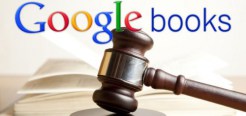L'Autorità Garante della Concorrenza e del Mercato, in data 26 luglio, ha autorizzato con condizioni…
US 2nd Circuit holds that Google Books does not infringe copyright

by Jacopo Ciani (via IpLens)
 Nearly two years after the US District Court for the Southern District of New York decision on the Google Books Library Project, the US Court of Appeals for the 2nd Circuit confirmed that the scanning activities of Google within its Library Project are to be considered a fair use of copyright works under §107 of the US Copyright Act (full text here). The Litigation was brought against Google by the Association of American Publishers (AAP) and the Authors’ Guild, on behalf of authors whose books Google had digitized without permission, claiming that Google’s digital copying ofentire books, allowing users through the snippet function to read portions, would infringe author’s copyrights, providing consumers with a substitute for the original works.
Nearly two years after the US District Court for the Southern District of New York decision on the Google Books Library Project, the US Court of Appeals for the 2nd Circuit confirmed that the scanning activities of Google within its Library Project are to be considered a fair use of copyright works under §107 of the US Copyright Act (full text here). The Litigation was brought against Google by the Association of American Publishers (AAP) and the Authors’ Guild, on behalf of authors whose books Google had digitized without permission, claiming that Google’s digital copying ofentire books, allowing users through the snippet function to read portions, would infringe author’s copyrights, providing consumers with a substitute for the original works.
In 2012, the AAP and Google concluded a settlement agreement, but this did not arrest the ongoing litigation between the Authors’ Guild and Google.
Judge Pierre N. Leval held among other things that Google’s making of a digital copy to provide a search function is a “highly transformative use”, with the meaning set forth inCampbell v. Acuff-Rose Music, Inc. (510 U.S. 569, U.S. 1994) to “add something new, with a further purpose or different character, altering the first with new expression, meaning, or message”.
In particular, the court said that Google’s book search function was transformative because it “augments public knowledge by making available information about the plaintiffs’ books without providing the public with a substantial substitute for matter protected by the plaintiffs’ copyright interests in the original works or derivatives of them”. Even if the snippet reveals some copyright–protected authorial expressions, the brevity and the cumbersome, disjointed and incomplete nature of the snippets just helps users to evaluate whether books falls within the scope of their interest, but does not allow to make them a competing substitute for the original. A unanimous three-judge panel rejected the Author’s Guild’s argument that Google’s distribution of the digital copies to libraries exposed the books to risks of loss. On the contrary, the court said that Google Books did not have a strong effect on the potential market for the books and that any losses would eventually address interests unrelated to copyright. If the decision will be upheld by the Supreme Court, it will predictably become a landmark ruling in copyright law. Its long term effects could be relevant. In addition to the public benefits of Google Books, which expands access to books and allows scholars to analyse huge amount of data, the decision might open the door for creating similar types of digitization projects involving copyrighted works. In this regard, it will be interesting to carefully follow if and how the decision will travel outside the United States, especially in those legal systems which does not have a fair use clause.
Predictably, in any case, the decision will not meet with unanimous praise. The decision proposes an extensive application of the transformative use doctrine, which could be interpreted as a lack of consistency concerning how the degree of transformativeness is to be assessed. This point could be matter for further guidance by the Supreme Court.
In the meantime, while Google heaved a sigh of relief, the next candidate is already on the horizon. It is the online trading platform Amazon, subject to both antitrust investigations and further calls for regulation. But this is another story…
22 ottobre 2015








